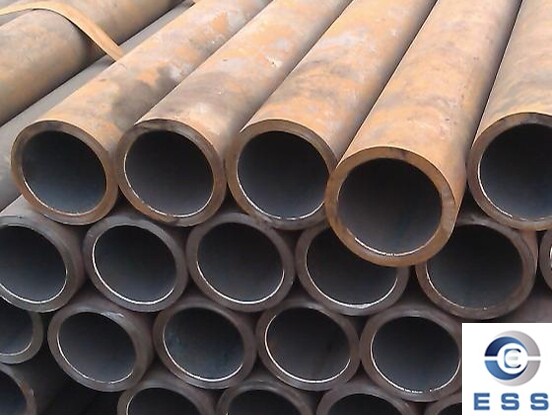
With the rapid development of industry,
boilers are used more and more widely, and the materials of tubes used in
boilers are becoming more and more. Boiler
tubes are a special steel pipe used for boilers and related thermal
equipment. They are mainly divided into seamless
steel pipes and welded
steel pipes. When choosing the material of boiler tubes, multiple factors
need to be considered, such as sealing, pressure resistance, corrosion
resistance, etc. This article will analyze the commonly used boiler tube
materials and explore their respective advantages and disadvantages.
Characteristics of boiler tube materials
1. Corrosion resistance
In the working environment of the boiler,
the pipes often contain corrosive substances such as water vapor and acidic
gases, so the boiler tube material is required to have high corrosion
resistance.
2. High temperature and high pressure
resistance
When the boiler is working, the temperature
and pressure are very high, so the boiler tube material must be able to
withstand the environment of high temperature and high pressure.
3. Good mechanical properties
The boiler tube material must have good
mechanical properties to ensure that it will not produce plastic deformation or
fracture under high temperature and high pressure.
Material classification of boiler tubes
1. Carbon steel boiler tubes
Made of mild
steel tubes and low alloy structural steel tubes, it is characterized by
low hardness and poor heat resistance, suitable for use at low temperatures and
general working conditions.
2. Alloy steel boiler tubes
By alloying and improving carbon steel, its
hardness and heat resistance are improved to a certain extent, suitable for use
under high temperature, high pressure and special working conditions.
3. Stainless steel boiler tubes
Common ones include 316 and 304 stainless
steel tubes, which have strong corrosion resistance and are suitable for
use in special environments such as chemical, petroleum and sanitary
industries.
4. High-pressure boiler tubes such as 20G
and 12Cr1MoVG
Suitable for use under ultra-high pressure,
requiring high temperature and high pressure resistance and high thermal
strength.
Advantages and disadvantages of boiler
tubes in different materials
1. Carbon steel boiler tubes
Advantages:
Low cost and good economy.
Good processing performance, easy to weld
and form.
Moderate strength, suitable for medium and
low pressure boilers.
Disadvantages:
Poor high temperature resistance, not
suitable for high temperature and high pressure environments.
Poor corrosion resistance, easy to rust.
2. Alloy steel boiler tube (such as
15CrMoG)
Advantages:
Good high temperature resistance, can work
for a long time under high temperature and high pressure environment.
High strength, good corrosion resistance.
Good anti-oxidation performance.
Disadvantages:
High cost.
It is difficult to process, and special
processes are required for welding and forming.
3. Stainless steel boiler tube:
Advantages:
Excellent corrosion resistance, suitable
for corrosive media.
Good high temperature resistance, can work
for a long time under high temperature environment.
High strength, good mechanical properties.
Disadvantages:
Very high cost.
It is difficult to process, and special
equipment and technology are required for welding and forming.
4. 20G high pressure boiler tube (carbon
manganese steel high pressure boiler tube):
Advantages:
Relatively low cost.
Good process performance (processing and
welding require standardized heat treatment and cold bending).
Meet medium high temperature and high
pressure requirements (≤450℃).
Disadvantages:
Limited high temperature strength
(significantly decreased at >450℃).
Poor oxidation resistance.
General corrosion resistance.
Scope of application
1. Carbon steel boiler tube
Applicable to low temperature and general
working conditions, such as heating boilers, industrial boilers, etc.
2. Alloy steel boiler tube
Applicable to high temperature, high
pressure and special working conditions, such as power plant boilers, nuclear
power plant boilers, etc.
3. Stainless steel boiler tube
Applicable to special environments such as
chemical, petroleum and sanitary industries, such as high temperature corrosion
environment, high purity water vapor environment, etc.
4.20G, 12Cr1MoVG and other high pressure
boiler tubes
Applicable to ultra-high pressure, such as
ship boilers, pressure vessels, etc.
Precautions for selecting boiler tube
materials
1. Determine the working environment
Before selecting materials, it is necessary
to clarify the environment that the material will withstand during work, such
as working temperature, working pressure, etc., which will determine the choice
of material.
2. Consider the corrosion resistance of the
material
Pressure boilers will produce acidic
solutions during operation, so the corrosion resistance of pipeline materials
is the key consideration for selection.
3. Consider cost and operability
When selecting the material of boiler
tubes, in addition to considering factors such as performance and corrosion
resistance, it is also necessary to coordinate cost issues and the ease of
processing of the material to facilitate later use and maintenance.













 Eastern Steel Manufacturing Co.,Ltd not only improve product production and sales services, but also provide additional value-added services. As long as you need, we can complete your specific needs together.
Eastern Steel Manufacturing Co.,Ltd not only improve product production and sales services, but also provide additional value-added services. As long as you need, we can complete your specific needs together.










